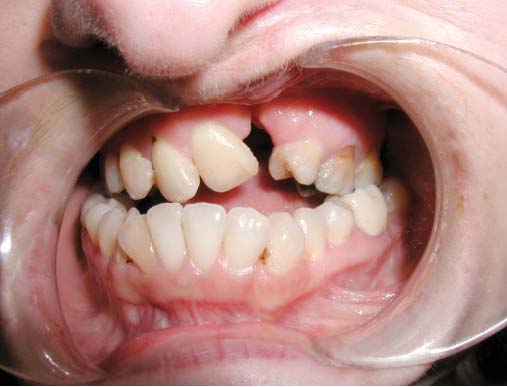By Ayo Bada
Senior Correspondent
Cleft lip and cleft palate, also known as orofacial cleft, is a group of conditions that includes cleft lip (CL), cleft palate (CP), and both together (CLP).
A cleft lip contains an opening in the upper lip that may extend into the nose. The opening may be on one side, both sides, or in the middle. A cleft palate is when the roof of the mouth contains an opening into the nose.
These disorders can result in feeding problems, speech problems, hearing problems, and frequent ear infections. Less than half the time the condition is associated with other disorders.
Cleft lip and palate are the result of tissues of the face not joining properly during development. As such, they are a type of birth defect. The cause is unknown in most cases.
Risk factors include smoking during pregnancy, diabetes, obesity, an older mother, and certain medications (such as some used to treat seizures). Cleft lip and cleft palate can often be diagnosed during pregnancy with an ultrasound exam.
But can a cleft lip or palate be successfully treated here in Nigeria?
Omobolanle Ogunlewe, a professor of oral and maxillofacial, College of Medicine, University of Lagos (CMUL), answered in the affirmative in her inaugural lecture.
She said: “Yes, it can be successful treated with surgery. This is often done in the first few months of life for cleft lip and before 18th months for cleft palate.
“Speech therapy and dental care may also be needed. With appropriate treatment outcomes are good.”
Ogunlewe, in her lecture entitled “Changing the world one smile at a time”, delivered at the main auditorium of the University of Lagos (UNILAG), gave credence to an international charity organisation, Smile Train, for making the treatment and surgery possible in Nigeria.
She also cited the moral, active support and commitment of former CMUL Chief Medical Director, Professor Akin Osibogun.
The lecture, which was chaired by UNILAG Vice Chancellor, Professor Rahamon Bello, marked the epitome of her career as a professor in the school.
Ogunlewe added: “In the last nine years, I have concentrated most of my practice on cleft care. In the more developed countries, most patients have their defects repaired within one year of birth.
“Repairs can be delayed for several reasons such as fear of death, lack of fund to pay hospital fees, inadequate facility, where facility is available (long distance from their place of abode), lack of skill and lack of awareness.
“This explains why we still have some individuals carrying the defect till adulthood.
“Over the years, I have searched for an area of maxillofacial surgery that will meet my patients’ expectations and at the same time give me feelings of fulfilment and satisfaction.
“I could not achieve this with cancer surgery. This is because 90 per cent of our patients report very late, when ‘their mouths have already killed them’.
“At this stage there is very little the surgeon can do other than watch them die slowly but peacefully. This is very disheartening!
“When surgery is carried out and the lesion is not completely eradicated, the outcome is not good and the patients’ appearance is worse off; despite that, the patient will sill move to the great beyond.
“I was therefore delighted when Smile Train came to Nigeria in 2007 and has been providing treatment grants for 65 health facilities for the surgical repairs of cleft lip and palate deformities in children.
“Smile Train is an international children’s charity organisation based in the United States. Since it arrived, it has put smiles on the faces of 13, 850 children, whose worlds have been changed so also the worlds of their parents.
“They are also providing funding for free cleft care in 87 countries. They also support training of health care personnel.
“I know of a Nigerian non-governmental organisation (NGO), H.E.W.S Foundation, which is replicating what Smile Train is doing in Nigeria.
“It has also funded the surgeries of some of our patients with benign jaw tumours. Where are the other NGOs?
“Tremendous progress has since been made in the area of cleft care due to the partnership with Smile Train.
“This partnership has also increased the awareness of these congenital anomalies in our country. Before then, we had thought that cleft lip and palate deformities were not a common occurrences in our environment.
“Going through our records, we were treating an average of 15 patients a year before the partnership with Smile Train, but now we have treated over 530 patients from 2007, putting smiles on the faces of parents and babies.
“We have indeed transformed the lives of these patients and their families. With the Smile Train grant, we have been able to improve our surgical skills, train more doctors and provide better care for cleft patients.
“During my Residency training programme only the consultants operated the cleft patients, but today, my resident doctors can carry out surgical repairs on their own.
“We have also been able to provide a holistic approach to the care of these patients incorporating other specialties like orthodontics, pediatrics cardiology audiology and paedodontics.
“The main objective of the management of cleft deformity is to achieve functional and anatomic repair of bony and soft tissue defects such that the child’s ability to speak, hear, and eat will be improved.
“Facial appearance will also be improved. Along with my colleagues, we advocate early treatment before the child begins peer interaction. This will minimise the social discomfort such children may experience as they grow.
“The lip is thus repaired at three months and the palate between one and one and half years.
The management of babies with cleft lip and palate deformities is best provided by an interdisciplinary team of specialists. This is because of the multiple and complex problems associated with this deformity.
Ogunlewe said while she desires a maxillofacial surgeon to restore smile to the faces of patients, it sometimes comes with challenges.
“One of the challenges is arriving at the diagnosis of the disease. Treatment may be delayed when the nature of the disease is not fully understood, coupled with lack of appropriate facility to aid diagnosis. Some rare cases pose diagnostic challenges.”
She enumerated three ways to change the world.
“The first is to focus on inner renewal day by day. Let us renew ourselves and have a better relationship with God. If we can change our ways and allow God to change us, then the world will change through us.
“Second is to start where you are. You don’t have to be a doctor, a governor or a president neither do you need billions of naira or foreign currency before you can touch lives.
“Wherever you reside, work or play, at any particular moment, once you have people around you that is a world in itself. There is hardly any one that lives in isolation.
“The third and final way is to identify the specific problem in your environment. If you want to make a change in your community, identify what is wrong.
“Figure out what you can do to change the situation. Find people of like minds who feel the same pain and have a passion for that issue. Team up with them and effect the change.”











